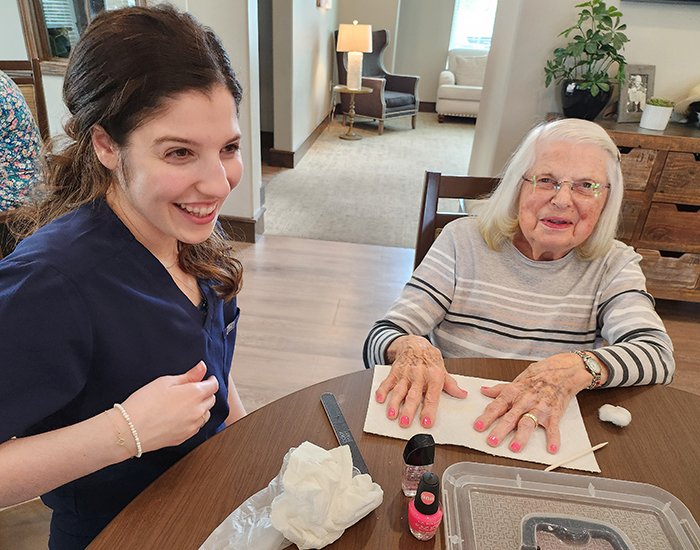A partnership between KU School of Medicine-Wichita and one of the city’s largest memory care providers is helping the school expand its research and community outreach surrounding Alzheimer’s disease and other forms of dementia.
The provider, ComfortCare Homes Wichita, recently made a donation to the school’s endowment fund that will be used for those purposes.
“We’re proud to be helping educate doctors on something that’s a growing epidemic for older folks,” said Micala Gingrich-Gaylord, CEO of ComfortCare.
Tiffany Schwasinger-Schmidt, M.D., Ph.D., director of the school’s Center for Clinical Research, said the relationship between KU Wichita and ComfortCare started a couple of years ago. That’s when she asked if third-year students could spend time in the group homes operated by ComfortCare.
The company, which will mark its 30th year in business in November, builds and remodels homes in established neighborhoods. The homes are staffed with caregivers 24 hours a day. The company currently cares for 90 residents.
Typically, a group of five to eight students doing their clinical neurology rotation go to a ComfortCare home for three to four hours. They join residents in activities such as bingo and baking and watch as they interact with the primary caregivers, who are certified nursing and medication aids.
Bliss Baird, a third-year medical student from Wellington, found the experience valuable, especially since she is considering specializing in neurology. ComfortCare employees encouraged students to not just observe but to interact with residents at the two homes she visited. One location was a traditional ComfortCare home, which offers dementia care similar to services offered in an assisted living facility, and the other was Founders Crest, which offers a higher level of dementia care. Baird led residents in stretching exercises at both.
“You could see how the response was different,” she said. “One (group) was more interested in our activities. The other was harder to engage.”
Baird enjoyed taking one resident for a walk through a garden and believes the resident did, too.
Baird also wanted to see how employees with years of experience caring for dementia patients approached their work.
“I asked one about that. How is the best way to interact with them? Her tip was being willing to listen to them and hear them talk, even if you have heard it before. It can be comforting to them.”
“This has been an incredibly successful partnership that allows us to teach our students about community-based memory care and the unique needs of this population,” Schwasinger-Schmidt said.
For its part, Gingrich-Gaylord said ComfortCare was “really quick to get on board” with Schwasinger-Schmidt’s proposal, realizing that it better prepared future physicians to care for its residents.
“There is limited medical training in psychosocial health, especially in the aging population,” said Gingrich-Gaylord.
As part of the arrangement, ComfortCare employees can take advantage of the same virtual reality training that medical students now receive on what it’s like to experience dementia.
ComfortCare’s donation to the school will allow for the acquisition of specialized equipment needed to expand its participation in clinical research trials into potential therapies for Alzheimer’s and other forms of dementia. Those trials are being done in conjunction with KU Alzheimer’s Disease Research Center in Kansas City. Obtaining the equipment should reduce the travel burden for participants here, Schwasinger-Schmidt said, adding that ComfortCare’s gift is the school’s first specifically benefiting clinical trials research.
The donation will also be used to educate health care providers, first responders and other community members about memory care, dementia research, cognitive testing and related matters.
ComfortCare owner Doug Stark said the need for more research into dementia is growing with the size of the older population. Nearly half of those 87 years and older suffer some form of it.
“Because of better health, heart stents, cancer treatments and other advances, there are lots of 85- and 92-year-olds running around,” he said.
Note: This article was originally published by KU School of Medicine-Wichita and is reprinted here with permission.












